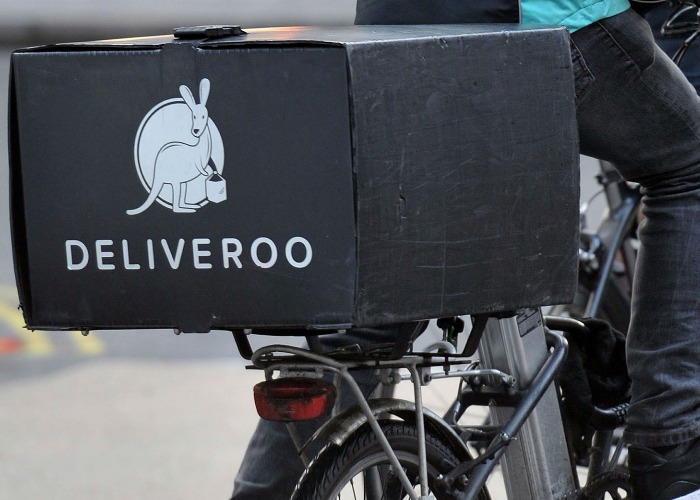Freelance working: ‘gig economy’ victims or empowered professionals?

We often think of self-employment as precarious, low-paid work. Yet freelancers say that’s not the whole story.
One in six working people is now self-employed – 4.77 million of us – according to thinktank Demos.
Chances are you’ve recently used the services of someone who is self-employed, by catching an Uber, or getting a Deliveroo delivery.
Over the past year, the latter company has become infamous for the way they treat their ‘contractors’; who in many ways are effectively workers.
Deliveroo riders get no minimum wage, sick pay, holiday pay or protection from unfair dismissal.
They’ve been dubbed ‘the precariat’ and there are fears that abuse of the lack of rules for self-employed workers is undermining the conditions of full-time employees.
Yet is this view of self-employed people fair? We talked to Matt Barrie, CEO of freelancer.com, about the people who use his site and the challenges they face.
How to use the internet to find freelance work
What qualifies as self-employed?
Firstly, a quick explainer: in the UK you are either an employee, a worker or self-employed.
Employees get the full set of employment rights; workers get some rights but don’t get a minimum notice period, protection from unfair dismissal or redundancy pay.
Those on controversial 'zero hour contracts', where employers aren't obliged to provide work, generally fall in the 'worker' category.
Self-employed people get almost no protection, other than from discrimination.
Uber drivers, for instance, got effectively promoted for self-employed contractors to workers in 2016 after the Employment Appeal Tribunal ruled against the company.
At its worst, the lack of protections for self-employed people has ended with them being asked to work for free in return for exposure.
In 2016, Sainsbury’s found itself in a row after advertising for artists to paint one of its stores for free:
Shame on @sainsburys An insult to *all* creatives. Try commissioning an artist & pay them like everyone else would pic.twitter.com/04LqycoQ4C
— Andrew Swann (@swanny_1980) 16 May 2016
Self-employed professionals
When we talk about the self-employed, it’s tempting to assume they are stuck in low-paid, precarious work.
“People who do not understand the sector conflate it with the gig economy” complains Chris Bryce, chief executive of the Association of Independent Professionals and the Self Employed.
He challenges the divide between ‘the privileged and the precariat’ or the assumption that self-employed people would rather be employed.
Self-employed workers are more likely to be middle class, and four in five are happy in their current situation, according to a report by Demos, the thinktank, earlier this year.
In fact, outside construction, the largest group of the self-employed work in ‘professional, scientific & technical activities’.
Occupations like taxi-driving have actually grown slower than self-employment as a whole in recent years.

According to freelancer.com boss Barrie, the bedrock of sites like freelancer.com are self-employed people with skills “web development, mobile app development, copywriting, data entry, internet marketing, translation and graphic design”.
Some of the website’s users are fully self-employed, but many are moonlighting alongside 9-5 jobs, in order to earn extra money, gain experience in different areas or balance work and family commitments.
27 well-paid part-time jobs you can do from home
Making ends meet
At its best, being self-employed means putting up with irregular income, as ex-loveMONEY write John Fitzsimmons found when he made the switch.
But how does the pay compare to someone in full-time work?
The internet means that freelancers can look for work from employers across the globe – but it also means employers can pick from a wider range of freelancers.
Many of these freelancers will be based in countries with a much lower cost of living than the UK and so could undercut freelancers based here.
Furthermore, self-employed people do not come under the National Minimum Wage.
Freelancer.com’s Barrie argues that prices are naturally prevented from going too low.
“It’s a frictionless market, so if someone posts a job at a lower price, they’ll get fewer people on it and they’ll get a lower quality of work…it’s really the ultimate free market.”
How to deal with late payments when you're self-employed
Empowering the self-employed
Competing with millions of other self-employed people for work sounds unappetising, but Barrie sees it as an opportunity.
“The traditional freelancers spent have their time chasing work”, he explains.
When work came in, these freelancers quickly found themselves overwhelmed and risked losing clients permanently by refusing jobs.
Now, these freelancers can subcontract overflow work to other self-employed people using the same websites they found the company assigning work on.
Barrie believes that the ability to subcontract online could help self-employed people in another way. Traditionally a graphic designer, for instance, would be restricted to graphic design.
“Now, what those graphic designers are doing is building apps. Now they can’t program those apps; so what they’re doing is hiring programmers…all the skillsets they didn’t have before.”
“It’s really helping the old-school freelancer move up the stack and become more sophisticated”
Want to sell stuff, not services? We've put together a guide to starting your own online shop
Pensions and tax
Even successful self-employed people face a number of other challenges, however.
The self-employed are not currently automatically enrolled into pensions, meaning many are saving nowhere near enough for retirement (read more about the looming pensions crisis here).
Earlier this year Demos called for the Government to enrol them in pensions and fund these by taxing companies that use freelance labour.
Another row is brewing as HMRC chases self-employed people for thousands of pounds after they used schemes, believed legal at the time, to reduce their taxes.
This year will show whether self-employment can really get away from its ‘precariat’ image.
Comments
Be the first to comment
Do you want to comment on this article? You need to be signed in for this feature